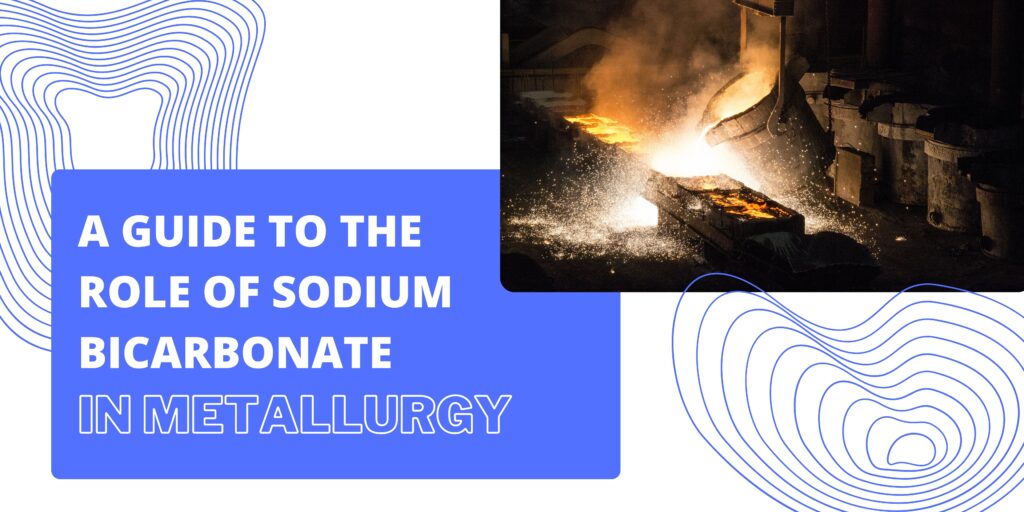
Metallurgy is the study and technology of extracting and processing metals from their ores, as well as refining them into useful materials. Throughout the history of metallurgy, several techniques and chemical procedures have been developed to improve metal extraction and purification. Among these chemical compounds that are essential to metallurgy is sodium bicarbonate. We shall examine the several uses of sodium bicarbonate in metallurgy, as well as its chemical makeup and effects on the metals sector, in this comprehensive article.
What is Sodium Bicarbonate?
Sodium bicarbonate, chemically known as NaHCO3, is a white, crystalline substance that is also referred to as baking soda or bicarbonate of soda. Because of its peculiar chemical properties, it is a versatile material with diverse applications in a wide range of sectors. Due to its water solubility, alkaline properties, and buffering abilities, it is a crucial part of numerous metallurgical processes.
Sodium Bicarbonate in Ore Pre-Treatment
Leaching of Ores
In metallurgy, the first step often involves the extraction of metals from their ores. Sodium bicarbonate is used in leaching processes to dissolve and extract metals such as gold and silver from their ore matrix. It acts as a mild leaching agent that helps to facilitate the separation of valuable metals from the gangue minerals.
Neutralizing Acidic Ores
When ores are acidic and include sulfur compounds, sodium bicarbonate is utilized to neutralize the acidity. This is especially significant in the extraction of base metals such as copper and zinc, where the ore can be very acidic. The addition of sodium bicarbonate helps to regulate the pH and makes future processing processes more tolerable.
Sodium Bicarbonate in Smelting
Fluxing Agent
Sodium bicarbonate is employed as a fluxing agent in smelting operations, such as the reduction of metal oxides to obtain pure metals. In this role, it helps lower the melting point of metal oxides, making them more accessible for reduction by other chemicals or processes.
Removing Impurities
Sodium bicarbonate can also be used to remove impurities in the form of slag during the smelting process. By reacting with impurities, it forms compounds that can be easily separated from the molten metal. This purification step is crucial in producing high-quality metals.
Sodium Bicarbonate in Metal Refining
Precipitation of Impurities
After smelting, metals often contain trace impurities that need to be removed. Sodium bicarbonate is employed as a precipitant to selectively remove these impurities through chemical reactions. This process is commonly used in refining non-ferrous metals like copper and lead.
Electrowinning
In electrowinning, sodium bicarbonate can be used to adjust the pH of the electrolyte solution, which is crucial in the electrorefining of metals like copper. Proper pH control ensures efficient metal deposition and minimizes the formation of undesirable byproducts.
Environmental Considerations
Emission Control
Metallurgical processes can generate various emissions, including acidic gases. Sodium bicarbonate is employed to scrub these emissions, neutralizing acidic pollutants and reducing the environmental impact of metal production.
Water Treatment
Metallurgy often involves the use of large amounts of water. Sodium bicarbonate can be used in water treatment processes to control pH and remove impurities, ensuring that water discharges meet environmental standards.
Case Studies
To illustrate the practical applications of sodium bicarbonate in metallurgy, let’s delve into a few case studies:
Gold Cyanidation: In gold mining, sodium bicarbonate is used to adjust the pH of the cyanide solution, optimizing the dissolution of gold and reducing the consumption of cyanide, which is toxic.
Copper Refining: Sodium bicarbonate is used in the electrowinning process for copper refining, where it helps maintain the appropriate pH level in the electrolyte solution.
Lead Smelting: In lead smelting, sodium bicarbonate is added as a flux to lower the melting point of lead compounds, aiding in the separation of lead from other materials.
Challenges and Future Prospects
Despite being a helpful tool in metallurgy, sodium bicarbonate has several disadvantages when used. These include the compound’s cost, the difficulties in handling and storing it, and the requirement to maximize its use in a variety of metallurgical operations.
Prospective investigations and advancements could focus on creating more economical and environmentally friendly substitutes for sodium bicarbonate, in addition to enhancing its effectiveness in diverse metallurgical uses.
Conclusion
Sodium bicarbonate, with its unique chemical properties, plays a vital role in various stages of metallurgical processes, from ore pre-treatment to metal refining. Its versatility as a leaching agent, fluxing agent, pH adjuster, and impurity precipitant makes it an indispensable tool in the metallurgy industry. As environmental regulations become stricter, sodium bicarbonate also contributes to reducing the environmental impact of metallurgical operations. While challenges exist, the continued research and development of sodium bicarbonate applications in metallurgy promise a more efficient and sustainable future for metal production.




